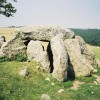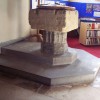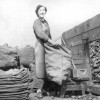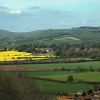Henry Thomas Toms grew up to be one of life’s characters. He was known as Harry Toms and later in life acquired the nickname of “Tapper”. Some thought he was a little eccentric; certainly he was one of those old-time independently minded individuals with curious ways we rarely see in our villages today.
He was the son of William Toms, a thatcher from West Lulworth who went to Winfrith Newburgh, a neighbouring village to find a wife. He married Mary Roberts at St. Christopher’s church, Winfrith, on the 8th of October 1833.
William took his bride home to Lulworth and on the 25th of May 1834 their first child Henry was baptised at Holy Trinity Church at West Lulworth. A further ten children would follow: John in 1836, Martha in 1837, Mary in 1838, Joseph in 1841, George in 1843, Sarah in 1846, Jane in 1848, Fanny in 1851. We have not carried out a forensic examination of the family history but it appears the first child Henry and the second child Martha died in infancy and we believe Fanny died aged about 6 years.
Then in 1854 William and Mary had another child they named Henry Thomas. Mary probably thought her days of nursing children were over but she would have been mistaken, because six years later at the age of 45 she again found herself pregnant and in due time a further son, Walter George, arrived. In 1871 Mary Toms then 56 years of age and a widow for these past six years was living in West Lulworth with her sons 16 years-old Henry Thomas and 11 year-old Walter George. Mary passed away in 1880.
Harry Toms worked as a general and sometimes agricultural labourer. It was the custom in those days to lay a neat hedge, but not Harry, who excused his work by saying “I don’t hold wi’ trimming hedge sticks, a good rough hedge ‘ull kip out cows”. Not surprising then, that he was not always fully employed and his work was said to be “average”, perhaps the result of losing his father at a young age before he could learn his father’s trade.
When trimming hedges he always found a walking stick to add to his collection, each stick had a ‘frost’ nail driven into the end of it to prevent slipping. He always used a stick and the noise of the nail on the hard road earned him his nickname – “Tapper”.
He was a man of regular habits and idiosyncrasies. Nightly he would “tap” his way to the Red Lion Inn at Winfrith where he would enjoy some ale and a smoke before setting-off home again, always leaving at 9 p.m. “Tapper”, we are told, never bathed and was often “itchy” and people got used to seeing him rubbing his back against a post. When summer came he would “tap” his way to the sea to wash his shirt, which he would wring out as dry as he could and then put it back on, it was dry by the time he got home. He believed sea water would not give anyone a cold and surprisingly he was always healthy. He told the time by the trains (try doing that today!). People described him as an interesting talker often using words that had long passed out of fashion.
In his later years he was employed on the farm of Mr. George Atwil at Winfrith and he made his home in an empty cow stall. It seems “Tapper” never slept in a bed or ate his meals from a table and he refused both when offered by Mr. Atwil. He would collect his meals from the farmhouse and ate in his cow stall and when he turned-in for the night he would remove his boots and sleep fully clothed covered with old coats in the feeding trough. It seems there was not a woman in Lulworth, Winfrith or Owermoigne who would entertain the prospect of taking “Tapper” for a husband.
We know “Tapper” was working at Atwil’s farm until at least 1916. When he became too old to work he was taken to the Workhouse at Wareham where he died in 1924. He was described as a “queer looking man, short, wiry, rather humped-backed, with busy eyebrows that overhung his sharp little eyes, and a ginger beard, and he wore a trilby hat with its crown always pushed up”.







